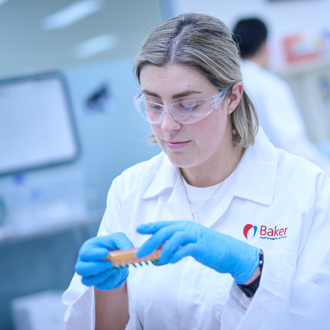
Reconsidering research helped Nicola find her passion
For a PhD researcher now focusing all her energy on a very specific protein in a very particular part of the body, Nicola Sergienko’s studies started out surprisingly wide, when she began arguably the broadest undergraduate degree possible.
“I started a double degree in arts/science at Monash University. I guess that shows out of high school I really didn’t know what I wanted to do exactly. But I soon dropped the arts side when I realised I was far more passionate about science, and graduated in 2014,” Nicola says.
Yet her pathway into scientific research was not clear from that point either.
“I really didn’t have a clue what being a researcher was all about. I’m a very social extrovert and I never really imagined that was the sort of person who worked in a lab.”
So after graduation Nicola considered medicine for a while and also started working as a medical receptionist, but she eventually realised she needed to give something different a try.
“I’ve always loved cardiovascular physiology. It was my favourite subject at university, so I jumped onto the Baker Institute’s website to scroll through all the labs working on projects in this area. That’s where I came across the work of Associate Professor Julie McMullen and her Cardiac Hypertrophy laboratory and it really caught my eye. I immediately sent an email to Julie and heard back within five minutes.
“This connection led to an opportunity volunteering in Julie’s lab once a week as a bit of a taster. That helped me get a feel for life in the lab, I met other scientists and I learnt about different research techniques. It was so much different to what I expected, and I found everything fascinating. I was hooked.”
From there Nicola identified an Honours project working with supervisor Dr Kate Weeks and now she is one year into a PhD with the same team, looking at the role of a particular protein — B55alpha — in the healthy and unhealthy heart, with the aim of refining therapeutics for heart disease.
“One of the things I really like is being able to look at my week and set my goals, plan my own experiments. I find that really rewarding. Generating your own results gives you a nice feeling of satisfaction, even if they don’t always turn out the way you want.
“At the moment we are using a big machine called a Langendorff, which gives us a better way of looking at the heart at a cellular level. I’d never been able to see these cardiomyocytes under the microscope until a few weeks ago, and they’re beautiful. Learning new things like this is what makes a PhD so exciting.”
Unsurprisingly for a self-confessed extrovert, it’s also the people at the Baker Institute that Nicola enjoys most about her experience.
“My supervisors are all incredible scientists and lovely people, they are very approachable. I love listening to all of the scientists at the Institute and hearing about the work they do, and I’ve also learned a lot from becoming involved in workplace committees.”
Nicola is a member of the Institute’s gender equity and diversity, wellbeing, and student committees, as well as its Reconciliation Action Plan working group.
“So much of the future is uncertain at the moment, but I’m excited to stay in research and contribute to this field in as many different ways as I can,” Nicola says.

